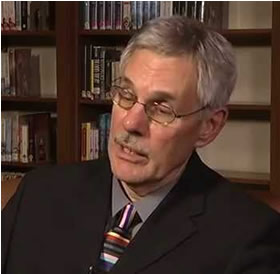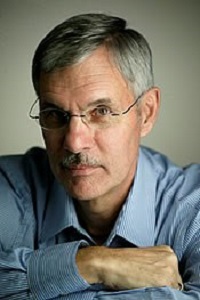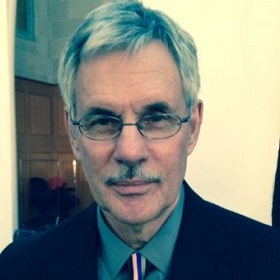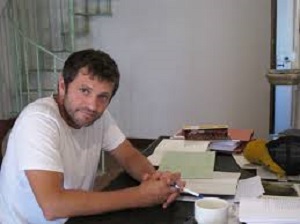De Amerikaanse dichter, schrijver en vertaler Norbert Krapf werd geboren op 14 november 1943 in Jasper, Indiana. Zie ook alle tags voor Norbert Krapf op dit blog.
Sancho Panza’s Beans
No Palm Sunday King,
I follow on my ass
wherever the master goes.
My saddle bags are full
of beans, garlic, and onion
which I boil on the fire
at night to feed his chimera.
I give him beans at night and he
makes poems during the day.
Him I serve, and his poem
that looks like a lance he
would stick into a windmill.
His poem is his salvation
which it is mine to serve.
We all have our means of expression.
I ride high on my ass with my bags
full of beans and say to myself,
“My kingdom for a bean or a poem.”
Black Cat Blues
Oh the Gasthaus is still closed,
the beer taps have dripped dry,
the stove is cold in the kitchen
and the Stammtisch is as quiet
as the church on Saturday night
when out on the sidewalk
at the first crack of dawn
struts the meanest-lookin’ black
cat these poor eyes ever did see.
Lord, have mercy, I’ll never
drink one too many again,
I’ll go to church every Sunday
and every First Friday too,
if only you make that mean
ole black cat keep struttin’
his stuff down the Hauptstrasse
right past the Gasthaus door.
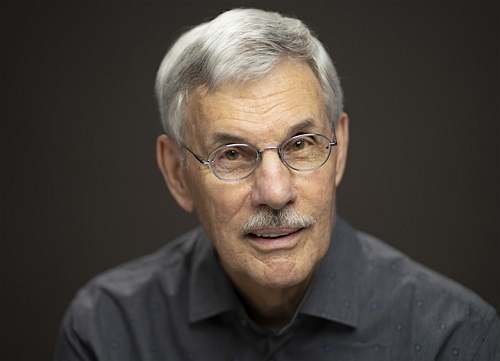
Norbert Krapf (Jasper, 14 november 1943)
De Zweedse schrijfster Astrid Lindgren werd als Astrid Ericsson geboren op 14 november 1907 en groeide op op de boerderij Näs in Vimmerby in Småland. Zie ook alle tags voor Astrid Lindgren op dit blog.
Uit: Pippi Langkous (Vertaald door Liesbeth Zuiderveen Borgesius-Wildschut en Saskia Ferwerd)
“Wat zou dat?’ zei Pippi. ‘We leven toch in een vrij land? Mag je niet lopen zoals je wilt? Bovendien lopen in Egypte alle mensen zo, en niemand vindt dat raar.’
‘Hoe weet je dat?’ vroeg Tommy. ‘Je bent toch nooit in Egypte geweest?’
‘Ik nooit in Egypte geweest?! Ik ben overal op de hele wereld ge¬weest en ik heb nog veel gekkere dingen gezien dan mensen die achterstevoren lopen. In India lopen de mensen op hun handen!’
‘Je liegt,’ zei Tommy.
Pippi dacht even na.
‘Ja, ik jok,’ zei ze verdrietig.
‘Jokken is stout,’ zei Annika, die nu eindelijk ook haar mond open durfde te doen.
Ja, het is heel stout om te jokken,’ zei Pippi nog verdrietiger. ‘Alleen vergeet ik dat weleens. Hoe moet een klein meisje, dat een moeder heeft die een engel is en een vader die koning is op een eiland in de Stille Zuidzee, en dat zelf haar hele leven heeft gevaren, nou altijd de waarheid spreken? En bovendien is er in Kongo in Afrika geen mens die de waarheid spreekt,’ zei Pippi toen stralend. ‘Ze jokken daar de hele dag! Van zeven uur ’s morgens tot zonsondergang! Dus áls ik eens per ongeluk een keertje jok, dan moeten jullie maar den¬ken dat het alleen komt doordat ik een beetje te lang in Kongo in Afrika ben geweest. We kunnen toch wel vriendjes zijn?’
‘Ja hoor,’ zei Tommy. Hij voelde plotseling dat het vandaag geen saaie dag zou worden.
‘Komen jullie bij mij eten?’ vroeg Pippi.
‘Ja leuk,’ zei Tommy. ‘Kom Annika, dat doen we.’
‘Ja!’ zei Annika.
‘Maar eerst moet ik jullie nog voorstellen aan meneer Nilsson,’ zei Pippi. En toen nam het aapje beleefd zijn hoed af.
Ze gingen door het gammele hek van Villa Kakelbont. Daarna liepen ze over het grindpad langs met mos begroeide bomen naar het huis met de veranda. Daar stond het paard haver aan te eten uit een soepbord.
‘Waarom heb je een paard op de veranda?’ vroeg Tommy. Alle paarden die hij kende, woonden in een stal.”

Astrid Lindgren (14 november 1907 – 28 januari 2002)
Scene uit de gelijknamige film uit 1969
De Amerikaanse journalist en schrijver P. J. O’Rourke werd geboren op 14 november 1947 in Toledo, Ohio. Zie ook alle tags voor P. J. O’Rourke op dit blog.
Uit: Eat The Rich
“I had one fundamental question about economics: Why do some places prosper and thrive while others just suck? It’s not a matter of brains. No part of the earth (with the possible exception of Brentwood) is dumber than Beverly Hills, and the residents are wading in gravy. In Russia, meanwhile, where chess is a spectator sport, they’re boiling stones for soup. Nor can education be the reason. Fourth graders in the American school system know what a condom is but aren’t sure about 9 x 7. Natural resources aren’t the answer. Africa has diamonds, gold, uranium, you name it. Scandinavia has little and is frozen besides. Maybe culture is the key, but wealthy regions such as the local mall are famous for lacking it.
Perhaps the good life’s secret lies in civilization. The Chinese had an ancient and sophisticated civilization when my relatives were hunkering naked in trees. (Admittedly that was last week, but they’d been drinking.) In 1000 B.C., when Europeans were barely using metal to hit each other over the head, the Zhou dynasty Chinese were casting ornate wine vessels big enough to take a bath in–something else no contemporary European had done. Yet, today, China stinks.
Government does not cause affluence. Citizens of totalitarian countries have plenty of government and nothing of anything else. And absence of government doesn’t work, either. For a million years mankind had no government at all, and everyone’s relatives were naked in trees. Plain hard work is not the source of plenty. The poorer people are, the plainer and harder is the work that they do. The better-off play golf. And technology provides no guarantee of creature comforts. The most wretched locales in the world are well-supplied with complex and up-to-date technology–in the form of weapons.”

P.J. O’Rourke (Toledo, Ohio, 14 november 1947)
Cover
De Nederlandse schrijver en columnist Jonathan van het Reve werd geboren op 14 november 1983 in Amsterdam. Zie ook alle tags voor Jonathan van het Reve op dit blog.
Uit: De boot en het meisje
`Ik heb misschien een boot.’
Rosa reageert niet. Ze zit met haar benen over elkaar aan de bar en bladert door een tijdschrift. M en toe drinkt ze door een rietje van haar cocktail.
`Hé?’ zeg ik. ‘Roos?’
`Ja?’
`Hoor je wat ik zeg?’
Nu kijkt ze mij aan ‘Ja,’ zegt ze. ‘Wat voor boot heb je misschien?’
`Een grote,’ zeg ik. ‘Om op te wonen.’
`Dat meen je toch niet? En ga je dan geen huis meer kopen?’ Ze houdt haar vinger op de plek waar ze gebleven was met lezen.
`Nee!’ zeg ik. ‘Dat zeg ik: ik ga op een boot wonen.’
`Jezes Leo, wat een stom plan. Waar leg je hem dan neer? Op Vlieland?’
`Nee, gewoon, hier, in een gracht of in de Amstel.’
`Getverdemme; zegt ze. ‘Een woonboot.’ Ze leest verder.
`Hoezo getverdemme? Het is geen woonboot, het is een zeilboot. Eentje die het echt doet, met een mast en een motor. In de zomer kunnen we dan over het Wad naar Denemarken varen.’
Rosa kijkt weer op.
`Jezesmina,’ zegt ze. `Je meent het echt. En wat bedoel je met “misschien”? Waar hangt het van af of je hem “hebt”?’
`Nergens van. Ik heb de eigenaar al de hand geschud over de telefoon. Ik hoef hem alleen nog maar op te halen.’
`Sjongejonge, Leo. Goed werk hoor.’ Ze neemt een slokje en gaat verder met lezen. Ik bestel nog een biertje. In mijn hoofd stel ik alvast een gastenlijst samen voor de zeiltocht van deze zomer. Vijf mannen, vijf vrouwen, geen honden, geen kinderen. Ideaal. Tenzij niemand kan, want dan ga ik lekker alleen met Rosa. En om haar op stang te jagen verschijn ik dan steeds aan dek met een pijp en een schipperspet.
`Ik ga hem dit weekend halen,’ zeg ik. `Ga je mee? Ik kan wel wat hulp gebruiken.’
Rosa kijkt glazig. Ze legt haar vinger weer op de plek waar ze is.
`Zondag kan ik,’ zegt ze. ‘Zaterdag moet ik misschien werken. Maar hoe lang weet je dit eigenlijk al?’

Jonathan van het Reve (Amsterdam, 14 november 1983)
De Duitse schrijfster Olga Grjasnowa werd geboren op 14 november 1984 in Baku, Azerbeidzjan. Zie ook alle tags voor Olga Grjasnowa op dit blog.
Uit: Die juristische Unschärfe einer Ehe
“Leylas Zelle maß drei mal zwei Meter und sah aus wie der Hauptschauplatz eines schlechten Film Noir. Eine harte Pritsche und ein winziges vergittertes Fenster. Die Luft war stickig, und die Tage dehnten sich schamlos aus. Die meiste Zeit über lag Leyla auf dem Bauch, ihre Hände mit Handschellen auf den Rücken gefesselt. Ihr Körper widerte sie an. Sie hatte seit einer Woche nicht mehr geduscht. Auf ihrem Kleid waren mehrere Schichten Blut und Schweiß übereinander getrocknet. Sie war wegen illegaler Autorennen in der Innenstadt von Baku festgenommen worden. Die offizielle Anklage hätte »Rowdytum« lauten können, doch eine Anklage wurde nicht einmal erhoben. Autorennen gehörten zu den Hobbys der Goldenen Aseri-Jugend, und sie waren die letzte Möglichkeit der Revolte. Reiche Sprösslinge kauften sich von ihrem Taschengeld alte sowjetische Autos, auf die man einst ein Jahrzehnt warten musste. Die Rennen fanden bei Nacht und ausschließlich in belebten Gegenden statt, nicht selten kamen dabei Fußgänger ums Leben, was den Charme des Ganzen natürlich erhöhte. Niemand wusste, wer diese Autorennen erfunden hatte. Die Inhaftierten gaben nichts preis – und die Wärter fragten nicht nach. Bei der Präsidentenfamilie waren die Autorennen verpönt und gehörten zu den wenigen Vergehen, die sich nicht mit Geld regeln ließen. Die jungen Fahrer, es war noch nie jemand festgenommen worden, der älter als sechsundzwanzig gewesen wäre, wurden in der Regel auf der Polizeiwache festgehalten und von mehreren Beamten abwechselnd verprügelt. Eine durchaus gängige, ja sogar für diese Breitengrade harmlose Praxis. Und so wurde Leyla dreimal täglich von einem jungen Polizeischüler abgeholt und in Handschellen ins Untersuchungszimmer geführt. Es war derselbe Junge, der ihr das Wasser und das Essen brachte – schmächtig, von kleinem Wuchs und mit dem traurigen Blick eines ewigen Verlierers.
Das Untersuchungszimmer war geräumig und bis auf einen schmalen Tisch und zwei Stühle leer. Er band Leylas Hand- und Fußgelenke fest. Erst während der Fixierung kam der zweite Polizeischüler hinzu: eine operierte Hasenscharte, zwei Goldzähne und ansonsten symmetrische Züge mit zart geschwungenen Augenbrauen, die nicht zum unteren Teil des Gesichts passen wollten. Sie würde ihn wiedererkennen, egal, wann und wo. Seine rechte Hand wanderte langsam über Leylas Oberschenkel, verblieb bei der Scham, fand ihren Weg in ihre Unterhose, richtete dort ruhig und bestimmt ihr Unheil an und ließ nur ab, um sich den Rotz wegzuwischen, den Leyla tief aus ihrer Kehle in sein Gesicht geschleudert hatte. Womöglich gefiel ihm Leylas undurchdringlicher Hochmut. Als er fertig war, schlug er ihr mehrmals und mit solcher Wucht ins Gesicht, dass sie das Bewusstsein verlor. Beim Aufwachen schmeckte sie Blut in ihrem Mund und spürte eine Hand auf ihrer Brust.“
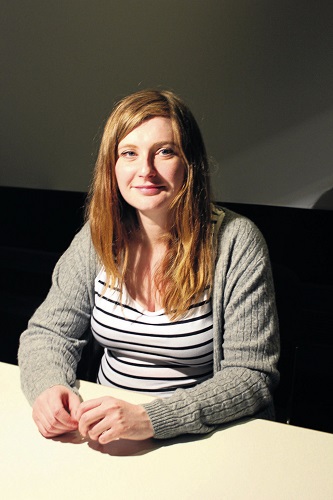
Olga Grjasnowa (Bakoe, 14 november 1984)
De Vlaamse schrijver, dichter, politiek activist en componist René Desiderius de Clercq werd geboren in Deerlijk op 14 november 1877. Zie ook alle tags voor René de Clercq op dit blog.
Niet iedereen kan heiden zijn
Niet iedereen kan heiden zijn.
Daartoe hoort kracht en moed;
een vast geloof in zon en wijn,
en blijde lust in ’t bloed.
Niet iedereen voelt zijn verlangst
voldaan op aardes schoot,
schrijdt door het leven zonder angst,
en zonder klacht ten dood.
De aardeling heeft aarde schier
Te moederlijk verwend.
De heiden leef zijn leven hier
in schoonheid tot het end.
De leeuwerik zingt van ’s ochtends vroeg.
De hemel, waar hij vliegt,
is hoog genoeg, is schoon genoeg.
Elk’ and’re hemel liegt.
Elk’ and’re hemel is een waan.
Alleen het luchtgewelf,
de diepten, waar de sterren staan,
bloeit heerlijk in mijzelf.
Oorlog teistert
Oorlog teistert. Alleroorden
Loert de dood op buit.
Krachtigen schrikken, heiligen moorden,
De wereld roeit haar eigen uit.
Arbeid, armoe, ziekte en zorgen
Verdwijnen voor de éne angst.
De dagen duren, de nachten langst;
Wat brengt de morgen?

René de Clercq (14 november 1877 – 12 juni 1932)
De Litouwse dichteres en schrijfster Jurga Ivanauskaitė werd geboren in Vilnius op 14 november 1961. Zie ook alle tags voor Jurga Ivanauskaitė op dit blog.
On the Plane
Those sitting by
the emergency exit
should abandon everything
but hope.
No doubt no doubt
handbags and briefcases
will hinder a headlong fall
from the dropping liner.
Wraps, throws, or cloaks
are not needed either,
hungry interspatial spirits
might get entangled in them.
The beards of poets
are less than desirable,
the devil grabs them
first of all.
It is advisable to shave
even leg hairs,
when erect they become sharp
and might tear the clouds.
It is necessary to
take off all clothes
be naked as newborns,
lovers or corpses.
Nudity is unavoidable
at crucial moments—
as in Bosch’s Paradise and Hell
or in Memling’s Last Judgment.
Everyone once fallen
is already swarming
with ruthless smiles
between the propeller’s wings.
Uit: 108 moons
108 moons stiffen in a rosary
falling stars stick in the snow
on a dazzled night at the foot of Kailash
time is not passing not passing not passing not passing not passing
Vertaald door Paul Perry en Ruta Suchodolskyte.

Jurga Ivanauskaitė (14 november 1961 – 17 februari 2007)
De Duitse schrijfster Karla Schneider werd op 14 november 1938 geboren in Dresden. Zie ook alle tags voor Karla Schneider op dit blog.
Uit: Der Sommer, als ich Filmstar war
„So hatte er es sich selbst zuzuschreiben, dass gestern Abend keiner hatte Abschied feiern wollen.Jedenfalls nicht mit ihm. Wegen seiner Schinderei. Ich war vergattert worden,das Zeichenzugeben,wenn er mit seinem Bett zusammenkrachte. Die Dreibett-Klosterzelle, wo ich mit dem Frettchen und »Neonore Niebermann« (die wegen Polypen kein L sprechen konnte) schlief, stieß nämlich an die Zelle, wo die Ölsardine sich einquartiert hatte. Seine Bettstelle und meine standen praktisch Wand an Wand. Zwei Jungen hatten während des Abendbrots Austreten vorgetäuscht und das Oelsner-Bett präpariert. Das heißt, ausgehängt,ohnedassmanesvonaußensehenkonnte. Kaum hatte ich das freudige Ereignis gemeldet, hatten die Jungen einen armdicken Knüppel unter Ölsardines Türklinke verkeilt. Wir hatten uns darauf gefreut, wie er zetern und krakeelen würde, auf die Klinke hauen und drohen. Aber er gab keinen Mucks von sich. Er wusste wahrscheinlich noch von früheren Fällen her, dass das nichts brachte. Eigentlich hatten wir mit der Nacht ohne Ölsardine dann nicht mehr viel anfangen können. Ihn einzusperrenwarderGipfelgewesen. Zwei aus der Klasse konnten freihändig, also ohne Noten, Klavier spielen, aber immer nur dieselben drei Stücke. Andere Musik gab es in dem gottverlassenen Heim auf dem Simmersberg nicht. Möglich, dass die Heimleiterfamilie im Nachbarhaus Radio hatte, aber das nützte uns einen kalten Kaffee. Wir versuchten es noch mit Gesellschaftsspielen, Flaschendrehen und so, aber es wurde ziemlich schnell öde. Und überhaupt waren wir von der stundenlangen Wanderung und dem Anstieg auf den Berg, zum Landheim,dochreichlichkaputt. Gähnend versuchten wir, trotzdem noch ein paar Stunden durchzuhalten,damit Ölsardine,wenn er horchte,nicht dachte, wir würden unser Fest nicht rauschend genießen.“

Karla Schneider (Dresden, 14 november 1938)
Cover
Onafhankelijk van geboortedata:
De Amerikaanse schrijver Peter Orner werd in 1968 in Chicago geboren. Zie ook alle tags voor Peter Orner op dit blog.
Uit: Am I Alone Here?
“I’m in the cafeteria of San Francisco General Hospital. I come here once in a while. It’s a nice place to be distracted. I’ve been thinking about Chekhov, or trying to. I keep getting distracted. I have also come here today because I’m following up on a notion that in a hospital I’m closer to death than when I sit distracted in other places. I’ve seen no death today in this cafeteria. I’ve seen salads. Pudding. One of the doctors across the table from me is eating a bowl of strawberries while she tells another doctor about a third doctor’s relationship with, it seems, a fourth doctor. Married, kids.
“She’s so hard to talk to sometimes because her logic is so flawed. The crap she puts up with boggles the mind.”
“Where’s he based, this promiscuous pediatrician?”
“Parnassus.”
“Apollo on his mountain. Should have guessed. Prick. Comes down and slums it at General.”
Some patients down at the other end of the table keep high-fiving each other. I can’t make out what they’re celebrating. There — they did it again. High-five! There’s also a man doing laps around the cafeteria, shouting into a cell phone. I’ve seen him here before. “I’m telling you,” he shouts, “it’s the military industrial prison complex. Eisenhower warned us of this in his final State of the Union. Ike, who would have thought he’d be the one …”
Chekhov is sometimes called with, to my ear, a tinge of dismissal a “realistic” writer. As if Chekhov was merely the sort of writer, a realistic sort of writer, who merely records what he sees. He does it pretty well — if you like that sort of thing. Realism (or realisticism?) is what is, plain and simple. I wonder if this idea doesn’t give short shrift to experience itself by suggesting that there is some kind of objective reality that is the same for everybody.
And I don’t just mean the guy talking about President Eisenhower. Another lap. Here he comes again. No, wait. Now he’s talking to Eisenhower. No, sir, they didn’t heed you, sir. Not Lockheed Martin, not McDonnell Douglas, not Congress, nobody; they took your prophecy and stuffed it down the throats of we the people, plunked down another $3.5 million for a fighter jet — how many meatballs is that? Johnson said guns and butter, but he lied, while you, sir, you had the courage to call a spade a spade and nobody ever gave you a speck of credit because of course you helped create the mess in the first place, but at least you spelled it … No, sir, please, no false modesty, it was you …”
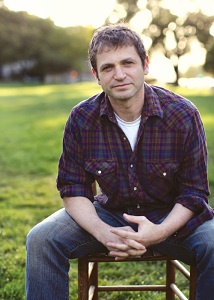
Peter Orner (Chicago, 1968)
Zie voor nog meer schrijvers van de 14e november ook mijn blog van 14 november 2015 deel 2.

